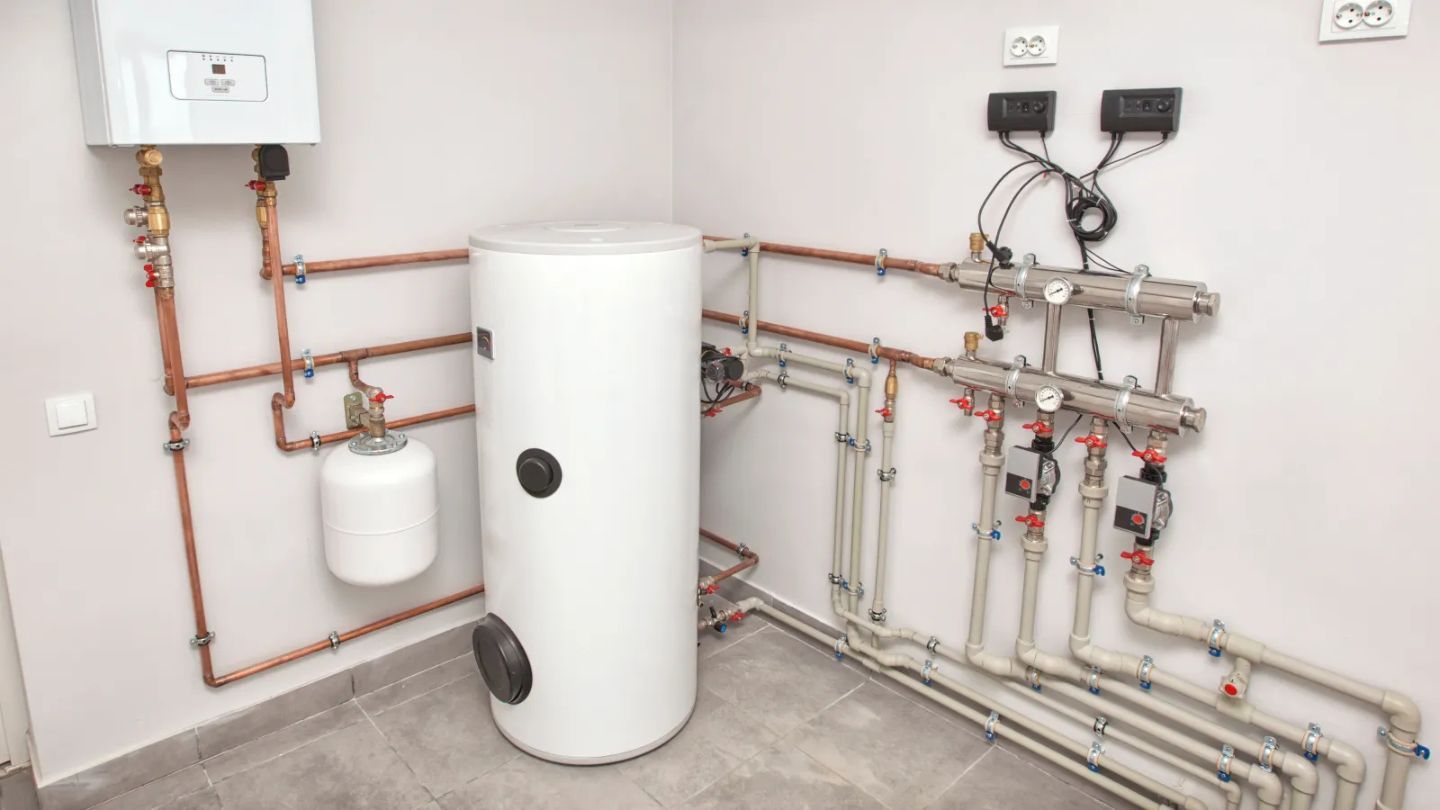Cleaning your water heater
regularly, at least once a year is crucial for maintaining its efficiency and
prolonging its lifespan. This comprehensive guide delves into the significance
of regular cleaning, outlines the necessary steps, and offers valuable tips to
ensure your water heater remains in optimal condition.
Key Takeaways
- Cleaning your water heater regularly, ideally once a year, can extend its lifespan and improve energy efficiency by preventing sediment buildup.
- Signs that your water heater needs cleaning include decreased hot water supply, strange noises, low water pressure, and discolored water.
- Professional maintenance not only enhances the efficiency and longevity of your water heater but also reduces the risk of unexpected failures. Regular maintenance can help prevent costly water heater repair by addressing issues before they escalate.
Importance of Cleaning Your Water Heater
Maintaining your water heater
goes beyond mere aesthetics. It's crucial for keeping the unit functioning
efficiently and prolonging its service life. Sediment accumulation in the
bottom of the tank impedes heat transfer by insulating against it, increasing
energy consumption and causing a decline in heating element efficiency.
Most water heater tanks can
handle pressures up to 150 psi, which is significant compared to common
household pressure measurements. Routine maintenance, such as flushing, can
substantially enhance your water heater's longevity—it's akin to rejuvenating your
appliance. Without proper care, you may encounter severe complications like
corrosion that could necessitate a full replacement of the unit. Regular upkeep
not only guarantees more efficient operation but also circumvents expensive
repairs or replacements.
Disregarding regular
maintenance of your water heater invites various issues, including diminished
efficacy, leading to potential total system breakdowns. Periodically flushing
out sediment from your water heater is essential to prevent these problems and
ensure the continuous, smooth, and economical operation of your device.
Frequency of Water Heater Cleaning

Regular maintenance is critical
for ensuring your water heater operates at its best. Flushing hot water heaters
annually helps prevent sediment buildup, which can impede performance and
reduce the unit's lifespan. However, maintenance intervals may vary depending
on water quality and the type of water heater.
For instance, areas with hard
water may require more frequent cleanings, potentially every six months, to
avoid mineral deposits that can damage the system. Tankless water heaters also
benefit from biannual descaling when exposed to hard water. Professionals can
assess your water's hardness and provide a tailored maintenance schedule to
meet your specific needs.
Regular maintenance improves
efficiency and reduces the likelihood of costly breakdowns, ensuring your water
heater continues to provide reliable hot water.
Signs Your Water Heater Needs Cleaning
When should you consider
servicing your water heater? A diminished hot water supply is often an early
indicator that the heater needs attention. This can mean sediment buildup
inside, which affects the heating element's efficiency and impedes the flow of
cold water into the system.
Hearing unusual sounds, such as
cracking or grumbling, from your tank suggests that a layer of sediment is at
its base. This accumulation forces your heater to expend more energy while
diminishing its effectiveness. If low pressure plagues your hot water tap, this
could be due to sediments hindering normal flow within your pipes.
The appearance of rust-colored
water from your hot taps could signal corrosion in the tank's interior. If the
water has an odor resembling rotten eggs, bacterial growth might have occurred
in stagnant areas within the unit. Recognizing these symptoms means it would be
prudent to conduct a thorough flush of our water heater to eliminate any
collected sediment and ensure proper functionality returns.
Steps to Professionally Clean a Water Heater
Cleaning a water heater
requires specialized tools and expertise to ensure safety and efficiency.
Here's how professionals approach the process:
- Preparation
and Safety:
Professionals start by turning off the water and power supply to the unit. For
gas water heaters, they manage the pilot light as required. The tank is allowed
to cool to prevent burns during the cleaning process.
- Draining
and Flushing: A
high-quality hose attached to the drain valve carefully directs water and
sediment out of the system. For tankless water heaters, a descaling solution is
circulated using a submersible pump to remove mineral deposits efficiently.
- Inspection: During the cleaning, experts inspect
critical components of water heater tanks, such as the anode rod, pressure
relief valve, and heating elements, for signs of wear or damage. These
inspections are vital to prevent future issues.
- Final
Checks and Reassembly:
After cleaning, professionals refill the tank, restore the power or gas supply,
and test the system for leaks and proper functioning. They ensure that all
safety measures are in place and that the water heater is operating optimally.
Relying on professional
services for this process eliminates the risks associated with DIY maintenance.
Expert care ensures a thorough job, extends the life of the unit, and provides
peace of mind.
Benefits of Professional Water Heater Maintenance
Undergoing professional
maintenance for your water heater brings numerous benefits. Skilled technicians
perform thorough checks and testing, guaranteeing that every part of the water
heater is in top condition. Such diligent care diminishes the likelihood of
sudden malfunctions, providing reassurance.
Efficiency improvements are
another benefit of expert maintenance on your water heater. The presence of
sediment impairs effective heating and can hike up energy costs. Maintenance
professionals swiftly detect and rectify such issues, ensuring optimal performance
from your heater.
Engaging with professional
maintenance services strengthens community confidence. Businesses like A-Total
Plumbing prioritize customer fulfillment by delivering outstanding service,
which in turn cultivates loyalty through positive endorsements from clients.
Lifespan of Different Types of Water Heaters

Every water heater has an
expected duration of serviceability. A standard water heater will normally be
functional for roughly 12 years. Gas storage-type water heaters have a lifespan
of 10 to 15 years, which is on par with their electric counterparts. Tankless
water heaters stand out by potentially providing efficient service for an
impressive 20 to 30 years.
Diligent maintenance plays a
vital role in achieving such longevity in your hot water heater's performance.
Sustaining the health of your hot water heater staves off the need for constant
repairs and prolongs its operational life. Essential to this upkeep is routine
cleansing that involves sediment removal and regular inspections—practices that
greatly contribute to ensuring that your tankless, traditional, gas, or
electric water heaters continue functioning efficiently over many years.
Additional Water Heater Maintenance Tips
Beyond routine cleanings,
professional maintenance can address other critical aspects of water heater
care:
- Pressure
Relief Valve Testing:
A professional technician will test this valve to ensure it is functioning
correctly and preventing dangerous pressure buildups.
- Anode
Rod Replacement:
Experts can evaluate the condition of the anode rod, a key component in
preventing tank corrosion, and replace it when necessary to protect the system.
- Comprehensive
Inspections:
Regular professional checks for leaks, rust, and wear help identify issues
early, preventing costly repairs and ensuring optimal performance.
These additional measures are
best performed by trained professionals who have the tools and expertise to
handle complex tasks safely and efficiently.
Cost of Professional Water Heater Cleaning Services
The cost of professional water
heater cleaning services typically ranges from $75 to $250, depending on the
type of water heater and the extent of cleaning required. While tank-type water
heaters are on the lower end of the range, tankless systems may require more
intensive descaling and thus cost slightly more.
Choosing professional services
ensures that your water heater is not only cleaned thoroughly but also
inspected for potential issues, which could save significant costs down the
line. With upfront pricing, professionals provide clear estimates before starting
the job, eliminating surprises and helping you budget effectively. This
comprehensive service offers excellent value by extending the lifespan of your
water heater and maintaining energy efficiency.
Conclusion
Regular professional
maintenance of your water heater is crucial for ensuring its optimal
performance and longevity. Trusting experts to handle cleaning and upkeep not
only eliminates the risks of DIY methods but also ensures thorough inspections,
preventive care, and tailored solutions designed to meet your specific needs.
For those searching for a tankless water heater near Kennesaw, A-Total Plumbing - An Ace Home
Services Company, offers reliable and professional services. Serving
Cartersville, Kennesaw, Atlanta, and North Georgia, our skilled team is
dedicated to addressing all your water heater maintenance and repair needs.
Whether it's a routine check-up or an urgent repair, we ensure high-quality
solutions to keep your water heater running efficiently. Don't wait for a
breakdown—contact A-Total Plumbing - An Ace Home Services Company, today and
enjoy uninterrupted hot water year-round!
Frequently Asked Questions
Can regular water heater maintenance improve energy
efficiency?
Yes, regular maintenance, such
as flushing out sediment and checking components, helps the water heater
operate more efficiently and lower energy consumption.
How does hard water impact a water heater?
Hard water leads to mineral
buildup, which can reduce heating efficiency and shorten the unit's lifespan.
Regular descaling can prevent this.
What's the difference between flushing a tank water heater
and a tankless one?
Flushing a tank water heater
involves draining the tank to remove sediment, while a tankless system requires
descaling to eliminate mineral buildup from its internal components.

